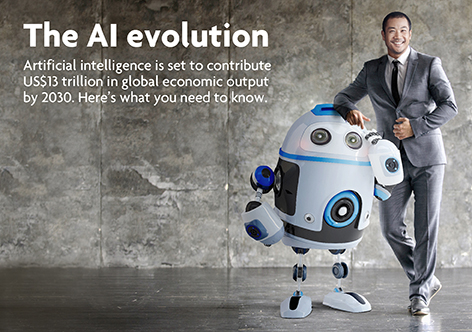Share:


Meet GAN, the new AI-inspired Michelangelo
Robots can not only calculate and analyse data in seconds, they can also talk, draw and even paint. The future will look very different with robots living among us.
In October 2018, British auction house Christie’s sold off a piece of art – The Portrait of Edmond Belamy – for an unprecedented US$432,000. It was 40 times the estimated price that auctioneers had placed on the painting.
Featuring a portly man with undistinguishable features who leans slightly to the right, the painting, which looked slightly incomplete, did not seem out of sync with modern art. The only clue that this painting was not normal was an odd signature plastered at the bottom right:
The painting may have featured a human and looked like it was painted by a human artist but it was all created by a computer. The entire portrait had been generated from a single algorithm, powered by an artificial intelligence (AI) neural network called GAN.
The Christie’s sale marked the first time that an AI-created artwork had been sold off at a major art auction, heralding a moment where technology gained a foothold in the art industry – one of the last areas where it has not yet made a significant impact.
For most people, AI falls squarely in the realm of logic, math and science. It is often associated with the likes of completing tedious manual tasks, or executing market analysis. More recently, it has started to dominate intellectual games such as Go and chess but these are human activities that do not inspire people the way Michangelo’s “The Creation of Adam” does.
But all that may soon change. As companies get creative with their innovative breakthroughs, a day may come when the robot learns to produce the works of art such as music, stories and even movies – all on their own.
Learning by doing
A key factor for AI’s success is the result of advancements in the concept of machine learning. Machine learning is the process by which algorithms are focused on finding patterns in data, and using those patterns to make predictions.
The advancements made in machine learning are now fuelling another field of AI called deep learning. This allows computers to learn in the same way that the human brain works.
The potential of this technology is profound. Instead of relying on pure processing power, deep learning enables computers to evolve by learning from its past.
In chess, for instance, Google’s machine learning AI AlphaZero played against itself repeatedly, millions of times in a matter of months. It eventually mastered the game, far surpassing any human grandmaster with years of experience, and even beating other chess programmes which relied on raw processing power to calculate moves.
The rise of AI
The impact of AI on the economy is likely to be massive. Consulting firm McKinsey estimates that AI will bring an additional economic output of around US$13 trillion by 2030, boosting the global gross domestic product by about 1.2 per cent a year.
Already, the technology is making huge waves in industries such as healthcare and finance.
In healthcare, AI is helping doctors make smart decisions about diagnosis, helping patients with early detection while AI-enabled robots are delivering more efficient and effective treatments. Investment in AI healthcare is expected to reach US$6.6 billion by 2021, according to some estimates. Consulting firm Accenture also believes that AI will result in annual savings of US$150 billion by 2026.
In finance, fund managers are using AI to help them make better decisions about investments. In recent years, there have been a number of robo-advisory platforms offered to help investors automate their investments and make decisions based on data and algorithm. UOB Asset Management’s UOBAM Invest robo-advisory service, for instance, employs technology to help customise portfolios for corporate investors, tailoring solutions to meet specific financial objectives – all in real-time.
Walking among robots
AI’s impact on the economy and society will only grow, as the technology continues to evolve. GAN is also not the first AI to be welcomed by people. Sophia, the talking robot, was recently declared a citizen by Saudi Arabia.
Whatever the case, robots are here to stay, work and even paint with us.
Find out more about the United Global Innovation Fund, which invests in innovative companies across various industries.




